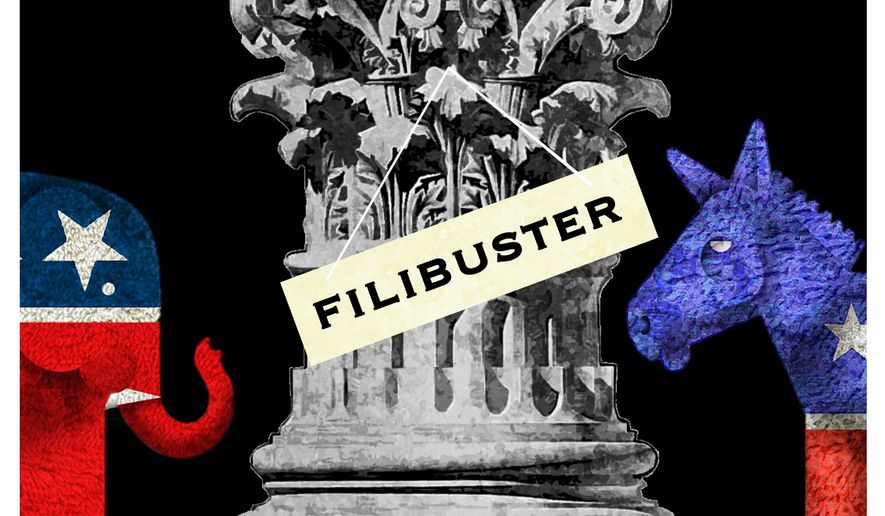OPINION:
This week, Senate Minority Leader Mitch McConnell postponed a legislative showdown over the debt ceiling and took one ugly and difficult chore off the plate of congressional Democrats by making a deal to raise the debt ceiling by $480 billion. Mr. McConnell pursued this course of action mainly because some members of his own caucus were starting to get anxious.
To the public, however, Team McConnell characterized the gesture as part of their ongoing effort to avoid filibuster reform. In this sentiment, they were joined by numerous Republicans, elected and otherwise.
That sentiment is wrong and wrongheaded.
Senate rules – especially Senate Rule 22, which essentially requires 60 votes for the Senate to proceed to any legislation — exist to protect both the institution and individual senators. They do not exist to protect voters.
The 60-vote threshold allows senators to evade and avoid difficult votes. This is and has been true for both sides and across a range of issues. It is most helpful to senators in those instances in which a senator doesn’t want to vote the way his constituents want him or her to vote.
It protects senators from having to take votes that would shorten or end their careers. That is, in large measure, why it has survived.
All sorts of senators — from Sen. Elizabeth Warren, Massachusetts Democrat, to the late Sen. Jesse Helms, North Carolina Republican — have used the filibuster to avoid votes on everything from police reform to gas taxes. In this session, the 60-vote requirement will help “moderate” Democratic senators avoid votes on voting rights legislation, packing the courts, gun control and tax increases.
If the moderate Democrats in the Senate were compelled to get on the record on these issues, their careers would be over either because they would be challenged in primaries or because they would lose in the general election. Either way, they would be gone and replaced by Republicans.
From a practical and political point of view, it would be better in the long run for the Republicans if Rule 22 disappeared. Because Republican electoral strength is national while Democratic strength is limited mostly to the Pacific coast and the Northeast, the Republicans have a built-in advantage concerning the Senate.
Right now, there are almost a dozen Democratic senators – Jon Tester of Montana, Sherrod Brown of Ohio, Joe Manchin III of West Virginia, Kyrsten Sinema and Mark Kelly of Arizona, Gary Peters and Debbie Stabenow of Michigan, Raphael Warnock and Jon Ossoff of Georgia, and Jeanne Shaheen and Maggie Hassan of New Hampshire — who represent states that are reliably Republican. There is only one Republican – Susan Collins of Maine – who represents a state that is definitively Democratic.
In a Senate where voting histories were straightforward and senators could not hide behind the process, Republicans would routinely (if not almost always) have between 52 and 60 senators.
Over time, clarity in the Senate will benefit Republicans. When differences between the parties are defined and obvious, Republicans tend to do better. The 60-vote threshold blurs the distinctions by helping senators avoid defining votes when they perceive that such votes might hurt them.
Ultimately, the 60-vote requirement is a bit of fiction that can get changed pretty much at the whim of the majority. Former Senate Majority Leader Harry Reid, Nevada Democrat, changed it for judicial nominees (thank you). Just this week, current Senate Majority Leader Charles E. Schumer, New York Democrat, talked about creating an exception for the debt ceiling.
The hard rule in legislating is that if you have the votes, you vote. The Senate is no different. If there are 51 senators who want to vote for something, they can change the rule to allow for such a vote. But they rarely do because (again) the 60-vote requirement allows senators to avoid votes they don’t want to take.
In this Congress, for example, the Democrats could create exceptions for open borders or packing the Supreme Court, or federalizing elections. But there are not 50 votes for those things or pretty much anything on the progressive wish list. So moderate Democratic senators hide behind the 60-vote requirement.
Does the filibuster provide important ballast to the legislative process? Probably. In its absence, would the republic dissolve? Probably not. Mr. McConnell has noted, correctly, that such an approach would create a regime in which consideration of legislation would take a long time and be subject to multiple opportunities for amendments from all sorts of directions.
That’s bad news for the senators. They have a steady preference for order, predictable procedure, and, in some circumstances, the avoidance of clarity.
It is, however, good news for the voting public. The legislative process should be complicated and difficult, and it should provide voters clarity and an unobstructed line of sight into how their representatives vote.
• Michael McKenna, a columnist for The Washington Times, is the president of MWR Strategies. He was most recently a deputy assistant to President Trump and deputy director of the Office of Legislative Affairs at the White House.




Please read our comment policy before commenting.